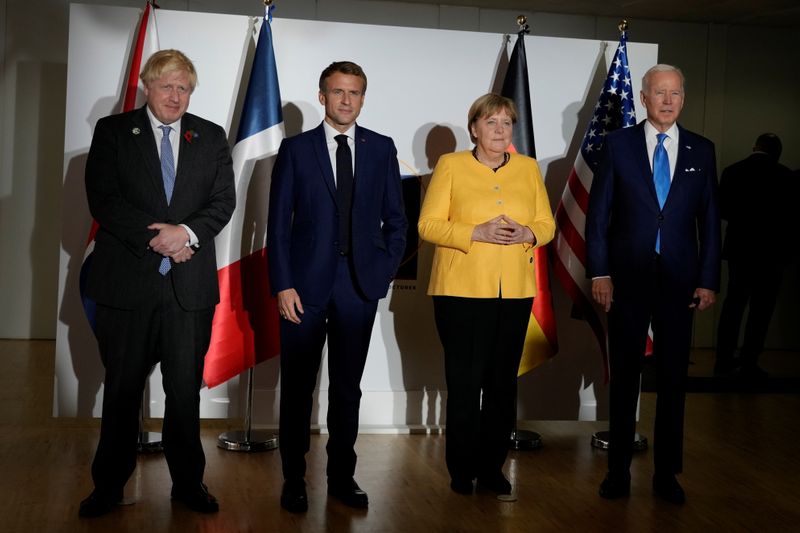5/5

© Reuters. Britain’s Prime Minister Boris Johnson, France’s President Emmanuel Macron, Germany’s Chancellor Angela Merkel and U.S. President Joe Biden pose for a family photo prior to a meeting during the G20 leaders’ summit in Rome, Italy October 30, 2021. Kirsty W
2/5
By Gavin Jones and Jan Strupczewski
ROME (Reuters) – Leaders of the Group of 20 major economies agreed on a final statement on Sunday that urges “meaningful and effective” action to limit global warming at 1.5 degrees Celsius but offers few concrete commitments.
The result of days of tough negotiation among diplomats leaves huge work to be done at a broader United Nations climate summit in Scotland, to where most of the G20 leaders will fly directly from Rome.
The G20 bloc, which includes Brazil, China, India, Germany and the United States, accounts for an estimated 80% of global greenhouse gas emissions.
The final document says current national plans on how to curb emissions will have to be strengthened “if necessary” and makes no specific reference to 2050 as a date to achieve net zero carbon emissions.
“We recognize that the impacts of climate change at 1.5°C are much lower than at 2°C. Keeping 1.5°C within reach will require meaningful and effective actions and commitment by all countries,” the communique said.
The 1.5C threshold is what UN experts say must be met to avoid a dramatic acceleration of extreme climate events like droughts, storms and floods, and to reach it they recommend that net zero emissions should be achieved by 2050.
The leaders recognised “the key relevance” of achieving net zero carbon emissions by the middle of this century.
China, the world’s biggest carbon emitter, has set a target date of 2060, and other large polluters such as India and Russia have also not committed to the 2050 target date.
U.N. experts say that even if current national plans are fully implemented, the world is headed for global warming of 2.7 degrees, with a catastrophic acceleration of events such as drought, storms and flooding.
The draft includes a pledge to halt financing of overseas coal-fired power generation by the end of this year, but set no date for phasing out coal power, promising to do so “as soon as possible”.
They also set no date for phasing out fossil fuel subsidies, saying they will endeavour to do so “over the medium term”.
On methane, which has a more potent but less lasting impact than carbon dioxide on global warming, they watered down their wording from a previous draft.
Source: Investing.com





























